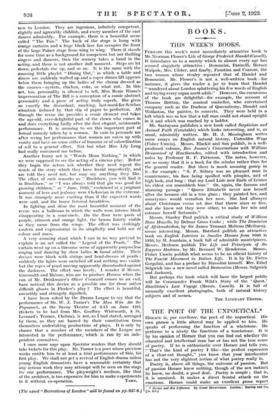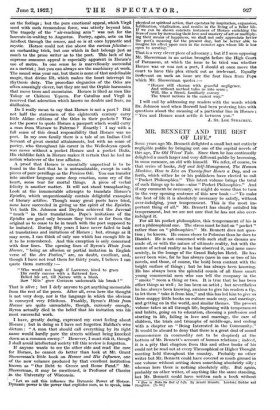THE POET OF THE UNPOETICAL.*
HORACE is, par excellence, tile poet of the unpoetical. His own phrase a little altered may be applied to him. He speaks of performing the function of a whetstone. He performs to a nicety the functions of a touchstone. It is by his opinion of Horace that you can find out whether the educated and intellectual man has or has not the true sense of poetry. If he is enthusiastic over Horace and tells you, " That's the kind of poetry I like—the perfect expression of a clear-cut thought," you know that your interlocutor has not the very slightest notion of what poetry really is.
Poetry is, above all things, the outcome of passion. But of passion Horace knew nothing, though of the sex instinct he knew, no doubt, a good deal. Poetry is simple ; that is, it is unmixed. It makes a direct frontal attack on the emotions. Horace could make an excellent prose report
• Horace and His IRAs:nee. By Grant Showerman. London Barrsp and Co. ps. net.)
on the feelings ; but the pure emotional appeal, which Virgil used with such tremendous force, was utterly beyond him. The tragedy of the " air-reaching arm " was not for the laureate-in-waiting to Augustus. Poetry, again, acts on the intellect through the senses, and so is at once hypnotic and mystic. Horace could not rise above the curiosa felicitas- an enchanting trick, but one which in fact' belongs just as much to the prose writer as to the poet. This lack of the supreme sensuous appeal is especially apparent in Horace's use of metre. In one sense he is marvellously successful as a metrist ; but you can always see the machinery at work.
The sound wins your ear, but there is none of that undefinable magic, that divine lilt, which makes the heart interrupt its rhythmic duty. The prosodist, elegancies of the Odes are often amazingly clever, but they are not the Orphic harmonies that move trees and mountains. Horace is liked as men like Tokay or Chiteau Yquem. For Catullus and Virgil is
reserved that adoration which knows no doubts and fears, no disillusion.
Do I really mean to say that Horace is not a poet ? Did not half the statesmen of the eighteenth century carry little Aldine editions of the Odes in their pockets ? Was not the power to quote Horace a passport which would carry a man from Warsaw to Palermo ? Exactly 1 I say with a full sense of this dread responsibility that Horace was no poet. In my own family there is a tale of an Indian Civil Servant of great mental attainments, but with no sense of poetry, who throughout his career in the Wellesleyan epoch was never without a pocket Horace and a pocket Hafiz.
His childlike faith in Horace makes it certain that he had no notion whatever of the true afflatus.
A proof that Horace is essentially unpoetical is to be found in the fact that he is untranslatable, except in such pieces of pure persiflage as the Persicos Odi. You can transfer
into another- language some deep emotion, some cry of the heart, some tear for mortal things. A piece of verbal felicity is another- matter. It will not stand transplanting.
Look at the innumerable attempts to translate Horace's Epistles, which unquestionably contain delightful examples of literary artifice. Though many great poets have tried, none have succeeded in giving us the spirit of the Epistles.
Yet both_ Dr. Johnson and Dryden achieved the Juvenal " touch " in their translations. Pope's imitations of the Epistles are good only because they travel so far from the original as to cense to be in touch with the poet supposed to be imitated. During fifty years I have never failed to look at translations and imitations of Horace ; but, strange as it may seem, I can think of only one which has enough life in it to be remembered. And this exception is only concerned with four lines. The opening lines of Byron's Hints from Horace, " being an allusion or partial imitation in English verse of the Ars Poetica," are, no doubt, excellent, and, though I have not read them for thirty years, I believe I can quote them correctly :-
" Who would not laugh if Lawrence, hired to grace His costly canvas with a flattered face, Belied his art, till Nature with a blush Saw ' Kits ' grow Centaurs underneath his brush ? "
That is alive ; but I defy anyone to get anything memorable from the rest of the poem. After all, even here the thought is not- very deep, nor is the language in which the obvious is conveyed very felicitous. Frankly, Byron's Hints from Horace are quite unreadable, though, curiously enough, Byron actually died in the belief that his imitation was his most successful work.
I have, greatly daring, expressed my met feeling about Horace ; but in doing so I have not forgotten Halifax's wise dictum : " A man that should call everything by its right name would hardly pace the streets without being knocked down as a common enemy." However, I must risk it, though
I shall avoid intellectual society till this review is forgotten. If anyone wants to see the other side and read the case for Horace, he cannot do better than look at Mr. Grant
Showerman'a- little book on Horace and His Influence, one of the new- volumes produced by that excellent institution
:known as " Our Debt to Greece and Rome Ftmd." Mr. Showerman, it may be mentioned, is Professor of Classics In the University of Wisconsin.
" Let us call this influence the Dynamic Power of Horace. Dynamic power is the power that explodes men, so to speak, into physical or spiritual action, that operates by inspiration, expansion, fertilization, vitalization, and results in the living of a fuller life. If we can be shown concrete instances of Horace enriching the lives of men by increasing their love and mastery of art or multiply- ing their means of happiness, we shall. not only appreciate better the poet's meaning for the present day, but be better able to imagine his effect upon men in the remoter ages whose life is less open to scrutiny."
That is a very clever piece of advocacy ; but if I were opposing Mr. Showerman in an action brought before the High Court of Parnassus, at which the issue to be tried was whether Horace was or was not a poet, I should at once move the court to have this plea struck out as irrelevant. Equally irrelevant on such an issue are the four lines from Pope which Mr. Showerman quotes :-
" Horace still charms with graceful negligence, And without method talks us into sense ; Will, like a friend, familiarly convey The truest notions in the easiest way."
I will end by addressing my readers with the words which Dr. Johnson used when Boswell had been pestering him with questions about the meaning of a particular line in Horace : " You and Horace must settle it between you." J. ST. LOE. STRACIIEY.











































 Previous page
Previous page